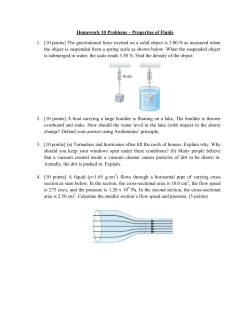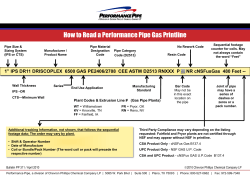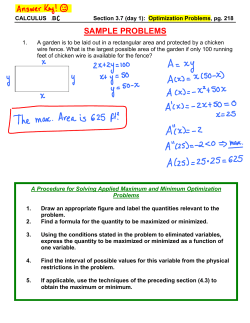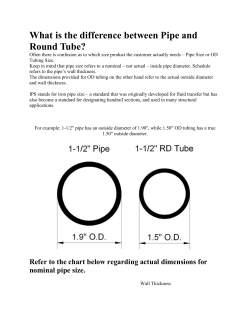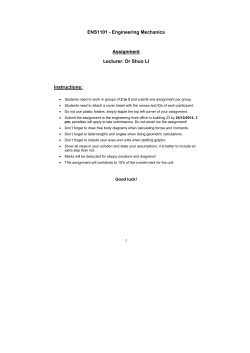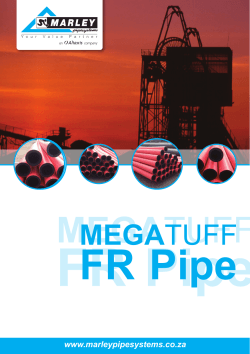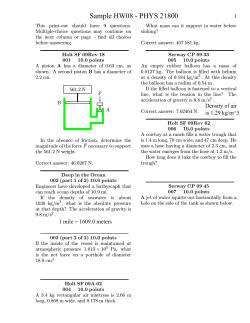
Uni-Bell PVC Pipe Association | PVC Pressure
Uni-Bell PVC Pipe Association | PVC Pressure Pipe: Potable Water, Reclaimed Water, Sewer Force Main PVC Non-Pressure Pipe: Sanitary Sewer and Storm Sewer Pipe Systems ENVIRONMENTAL PRODUCT DECLARATION VERIFICATION e This document covers PVC pressure pipe for potable water, reclaimed water, and sewer forcemain systems; and PVC non-pressure pipe for storm sewer and sanitary sewer systems. All pipes are made in lengths that are assembled at the job site. Each length has a belled end with a elastomeric gasket such that each pipe length’s spigot end fits inside the belled end of the next pipe length. Environmental Product Declaration Program Operator NSF International 789 N. Dixboro Rd. Ann Arbor MI 48105 USA www.nsf.org Date of Issue: Month, X, 20XX Period of Validity: X years Declaration#: 123456 Uni-Bell PVC Pipe Association – PVC Pipe Products ENVIRONMENTAL PRODUCT DECLARATION VERIFICATION EPD Information Program Operator Declaration Holder Product Potable Water, Gravity Storm Water, and Sanitary Sewer Pipe Systems NSF International Uni-Bell PVC Pipe Association Date of Issue May 15, 2015 Period of Validity 5 Years Declaration Number EPD10047 This EPD was independently verified by NSF International in accordance with ISO 14025: Internal Lori Bestervelt LBestervelt@nsf.org External [] This life cycle assessment was independently verified by in accordance with ISO 14044 and the reference PCR: J. Renée Morin, PRé morin@pre-sustainability.com LCA Information Basis LCA LCA Preparer This life cycle assessment was critically reviewed in accordance with ISO 14044 by: Potable Water, Gravity Storm Water, and Sanitary Sewer Pipe Systems, October 18, 2013 James Mellentine, Sustainable Solutions Corporation Cara Watson, Sustainable Solutions Corporation Rita Schenck, Ph.D. LCACP (Review Chair), Executive Director, Institute for Environmental Research and Education Nigel Howard, Managing Director, Clarity Environment Charlie He, Associate Vice President, Carollo Engineering PCR Information Program Operator Reference PCR Date of Issue PCR review was conducted by: EPD Program Operator NSF International 789 N. Dixboro Rd. Ann Arbor MI 48105 USA www.nsfsustainability.org The Norwegian EPD Foundation, with Addendum by UL Environment Piping systems for use for sewage and storm water (under gravity), The Norwegian EPD Foundation, with Addendum v2 by UL Environment 9/20/2012 (Addendum 6/10/2014) The Norwegian EPD Foundation PB 5250 Majorstuen, 0303 Oslo Date of Issue: May 15, 2015 Period of Validity: 5 years Declaration#: EPD10047 2 Uni-Bell PVC Pipe Association – PVC Pipe Products ENVIRONMENTAL PRODUCT DECLARATION: DETAILED VERSION Terms and Definitions/ Definition of Product Category The PVC pipe industry recognizes the benefits of communicating credible, science-based and transparent environmental information about its products. This document provides a baseline for 100 feet of seven different pipe products, used in various applications, to assist with measuring and understanding the environmental impacts of PVC pipe across the life cycle. The seven PVC pipe products examined are used for both pressure applications (potable water pipes, reclaimed water pipes and sewer force mains), and non-pressure applications (gravity sanitary sewer and gravity storm sewers). These products are listed below in Table 1. Application Pressure Pipe Pressure Pipe Pressure Pipe Storm Water Sanitary Sewer Sanitary Sewer Sanitary Sewer Standard Nominal Diameter AWWA C9001 AWWA C900 AWWA C9052 ASTM F7943/ AASHTO M3044 ASTM F794 ASTM D30345 ASTM F6796 8 in. 8 in. CIOD 24 in. Dimension Ratio/ Pipe Stiffness DR18 DR25 DR25 24 in. (profile wall) PS 46 8 in. (profile wall) 8 in. (solid wall) 24 in. (solid wall) PS 46 DR35 (PS 46) PS 46 Table 1. Products Included in Study 1 AWWA C900 Standard for Polyvinyl Chloride (PVC) Pressure Pipe and Fabricated Fittings, 4 in. through 12 in., For Water Transmission and Distribution. 2007. 2 AWWA C905 Standard for Polyvinyl Chloride (PVC) Pressure Pipe and Fabricated Fittings, 14 in. through 48 in., For Water Transmission and Distribution. 2010. 3 ASTM F794 Standard Specification for Poly(Vinyl Chloride) (PVC) Profile Gravity Sewer Pipe and Fittings Based on Controlled Inside Diameter. 2014 4 AASHTO M304 Standard Specification for Poly(Vinyl Chloride) (PVC) Profile Wall Drain Pipe and Fittings Based on Controlled Inside Diameter. 2011 5 ASTM D3034 Standard Specification for Type PSM Poly(Vinyl Chloride) (PVC) Sewer Pipe and Fittings. 2014 6 ASTM F679 Standard Specification for Poly(Vinyl Chloride) (PVC) Large Diameter Plastic Gravity Sewer Pipe and Fittings. 2013 EPD Program Operator NSF International 789 N. Dixboro Rd. Ann Arbor MI 48105 USA www.nsfsustainability.org Date of Issue: May 15, 2015 Period of Validity: 5 years Declaration#: EPD10047 3 Uni-Bell PVC Pipe Association – PVC Pipe Products This study uses data from seven manufacturers and 21 facilities to represent roughly 20% of all PVC pipe product capacity in the United States and Canada. The participating manufacturers are listed in Table 2 and include: Participating PVC Pipe Manufacturers Diamond Plastics Corporation IPEX, Inc. National Pipe & Plastics Corporation North American Pipe Corporation North American Specialty Products PipeLife JetStream, Inc. Royal Building Products Table 2. Participating Manufacturers The terms defined by the PCR are listed below: Environmental Product Declaration (EPD): environmental declaration providing quantified environmental data using predetermined parameters and, where relevant, additional environmental information Functional Unit: the quantified performance of a product system for use as reference unit Life Cycle Assessment (LCA): compilation and evaluation of the inputs, outputs and the potential environmental impacts of a product system throughout its life cycle Life Cycle Costing (LCC): investigation and evaluation of economic costs of a product or service from ‘cradle’ to ‘grave’ Product Category Rule (PCR): a set of specific rules, requirements and guidelines for developing Type III environmental declarations for one or more product categories Pressure Pipe: pipe for pressurized transport of potable water, reclaimed water, or sewage. Non-Pressure Pipe: pipe for non-pressure transport of sanitary sewage or drainage water. Piping system function: the function of the pipe is to transport (via gravity or pressure) a certain amount of liquid or sewage from a source location to a destination location EPD Program Operator NSF International 789 N. Dixboro Rd. Ann Arbor MI 48105 USA www.nsfsustainability.org Date of Issue: May 15, 2015 Period of Validity: 5 years Declaration#: EPD10047 4 Uni-Bell PVC Pipe Association – PVC Pipe Products Functional Unit/Reference Service Life The environmental impacts are reported per functional unit of a product and the functional unit is the basis for comparison in an LCA. For PVC pipe, the functional unit is 100 feet of installed pipe over a 100 year lifetime, as pipe length is a more useful functional unit than weight. To calculate the environmental impacts for 100 meters of installed pipe, multiply these EPD results by 3.28 feet per meter. The pumping energy required to pump water through the pipe during the use stage is considered and reported separately from the rest of the life cycle, since operating conditions can vary. System Boundaries The system boundary of this EPD is cradle-to-grave. This project considers the life cycle activities from resource extraction through installation and end-of-life effects. The boundary covers the product, construction process, use, and end of life stages, as seen in Figure 1. Figure 1. System Boundary EPD Program Operator NSF International 789 N. Dixboro Rd. Ann Arbor MI 48105 USA www.nsfsustainability.org Date of Issue: May 15, 2015 Period of Validity: 5 years Declaration#: EPD10047 5 Uni-Bell PVC Pipe Association – PVC Pipe Products Criteria for the inclusion of inputs and outputs (cut-off) Processes whose total contribution to the final result, in relation to all considered impact categories, is less than 1% can be neglected. The sum of the neglected processes may not exceed 5% by mass of the considered impact categories. If 5% is exceeded, a documented assumption is admissible. For Hazardous Substances, as defined by the U.S. Occupational Health and Safety Act, the following requirements apply: The Life Cycle Inventory (LCI) of hazardous substances will be included, if the inventory is available. If the LCI for a hazardous substance is not available, the substance will appear as an input in the LCI of the product, if its mass represents more than 0.1% of the product composition. If the LCI of a hazardous substance is approximated by modeling another substance, documentation will be provided. This LCA/EPD is in compliance with the cut-off criteria since no known processes were neglected or excluded from this analysis outside of the specific items listed below: Construction of capital equipment Maintenance of operation and support equipment Human labor and employee commute Ink for printing pipe label Casings for pipe installed under structures Fittings Shoring, soil compaction during installation of pipe Molecularly oriented PVC (PVCO) analysis Water consumption analysis Data Quality Requirements The data quality requirements are as follows: Data shall be as current as possible. Data sets used for calculations shall have been updated within the last 10 years for generic data and within the last 5 years for producer specific data; data sets shall be based on 1 year averaged data; deviations shall be justified. Both primary and secondary LCI and metadata are used throughout the study. All secondary data is taken from literature, previous LCI studies, and life cycle databases. The US LCI database (www.nrel.gov/lci) and the ecoinvent v2.2 database are frequently used in this analysis. The US LCI data are free and publicly available, and thus, offer both a high degree of transparency and an ability to replicate the results of the study; however, there are limitations, as some processes are missing for some of the products available in this LCI database, creating an issue with respect to completeness. If data gaps were identified, data from the ecoinvent v2.2 database were selected for the model. With each ecoinvent process used in this study, the data had already been adapted to US conditions via the SimaPro provider, EarthShift. EPD Program Operator NSF International 789 N. Dixboro Rd. Ann Arbor MI 48105 USA www.nsfsustainability.org Date of Issue: May 15, 2015 Period of Validity: 5 years Declaration#: EPD10047 6 Uni-Bell PVC Pipe Association – PVC Pipe Products Raw Materials Extraction and Origin PVC pipe compound ingredients are given in the units Parts per Hundred Resin (PHR). This means that for every 100 pounds of resin, the PHR amount should be added to the compound when mixing. This ensures consistency throughout the industry. The industry average PVC pipe formations are listed in Table 3. Raw Material Potable Water (PHR) 100 0.69 1.38 5.51 0.72 0.21 0.83 0.23 109.75 PVC resin Heat Stabilizer Paraffin Wax Calcium Carbonate Calcium Stearate Polyethylene Wax Titanium Dioxide Process Aid Impact Modifier Pigments Total Profile Sewer (PHR) 100 2.26 1.65 9.59 0.70 0.22 1.03 1.13 5.30 0.20 122.06 Solid Wall Sewer (PHR) 100 0.57 1.12 17.65 0.84 0.15 1.11 0.30 121.74 Table 3. PVC Pipe Product Formulation The average raw materials transportation distances are listed in Table 4 for each pipe included in the study. Raw Materials Transportation (km) 8" DR18 C900 8" DR25 C900 24" DR25 C905 24" PS 46 (profile) 8" PS 46 (profile) 8" DR35 PS 46 24" PS 46 Rail 949 1,580 1,376 3,024 1,879 1,298 1,436 Truck 109 97 114 297 94 143 157 Ocean Freighter 35 90 1 200 71 31 18 1,093 1,766 1,491 3,541 2,125 1,472 1,611 Total Table 4. PVC Pipe Raw Material Average Shipping Distances Production The production process begins when the raw materials are blended together, after which the compound flows into an electrically heated extruder. The compound passes through a die at the end of the extruder, where it is formed into a pipe shape. The pipe then moves through a sizing sleeve that provides dimensional accuracy. Solid-wall pipe is then water cooled, cut to length and labeled as the pipe moves to the end of the production line. Profile-wall pipe undergoes additional processing to EPD Program Operator NSF International 789 N. Dixboro Rd. Ann Arbor MI 48105 USA www.nsfsustainability.org Date of Issue: May 15, 2015 Period of Validity: 5 years Declaration#: EPD10047 7 Uni-Bell PVC Pipe Association – PVC Pipe Products form the profile shape. At the end of the production line, the pipe is belled and pressure tested (for pressure rated pipes). The pipe is then packaged and prepared for shipment from the manufacturing facility. The packaging is typically a set of wooden frames that hold the bundle of pipes together. Packaged pipe is loaded onto trucks for shipping. Transportation of pipes from production site to location is included in the production stage. The final PVC pipes are shipped throughout the United States and Canada. Each participating facility provided average transportation distances for the products investigated in this study. A weighted average was taken for each product in this study as seen in Table 5. All manufacturing facilities ship the PVC pipe via truck. Final Product Shipping 8" DR18 C900 8" DR25 C900 24" DR25 C905 24" PS 46 (profile) 8" PS 46 (profile) 8" DR35 PS 46 24” PS 46 Truck Shipments (km) 422 775 257 711 967 592 367 Table 5. Weighted Average of Final Product Shipping from Manufacturing Facilities Installation Installation of PVC pipe is assumed to be similar to other open-cut pipe installation, requiring the digging and refilling of a trench. The trench depth and time required to dig and re-fill it varies widely per region, soil type, climate, existing infrastructure, equipment operator, local convention, and other factors, so the actual installation time and effort is widely variable. For 8-inch pipe, the trench width used was at least 24 inches. For 24-inch pipe, the trench width should extend at least 36 inches. Typically, a hydraulic digger is used to dig the trench, and a small loader re-fills the trench. Scenarios: Two scenarios were identified for this study. The first scenario represents a trench depth of 4 feet for the 8-inch diameter potable water pipe, with an estimated 1.5 hours of machine run time for 100 feet of pipe. The second scenario represents a trench depth of 10 feet for the 24-inch diameter nonpressure pipe, with an estimated 2.5 hours of machine run time for 100 feet of pipe. Diesel fuel usage rates are estimated to be 8 gallons/hour for the digger 7 and 2 gallons/hour for the loader8. Therefore the 1.5-hour baseline scenario assumes 15 gallons of diesel is required to install 100 feet of pipe. The longer 2.5-hour scenario assumes 36 gallons of diesel is required to install 100 feet of pipe. No shoring was required. Gravel and sand was assumed to be used in the bedding and 7 Forum on Heavy Equipment. http://www.heavyequipmentforums.com/showthread.php?5804-Fuel-Consumption Accessed March 2013. 8 Forum on Forestry Forum. http://www.forestryforum.com/board/index.php?topic=14063.0. Accessed March 2013. EPD Program Operator NSF International 789 N. Dixboro Rd. Ann Arbor MI 48105 USA www.nsfsustainability.org Date of Issue: May 15, 2015 Period of Validity: 5 years Declaration#: EPD10047 8 Uni-Bell PVC Pipe Association – PVC Pipe Products haunching of the trench, per the Handbook of PVC Pipe: Design & Construction manual. A combined bulk density of 120 lb/ft3 was assumed9. Not all pipe installations require bedding, and some installations can use native soil. Figure 2. Trench Cross-Section Diagram Use (100 years) It is assumed that replacements or repairs of pipes will not be necessary during the course of 100 years. Pumping energy is required to compensate for the friction against the water flow caused from the inner wall of the pipes of pressurized piping systems. To calculate the amount of energy required of the pumps for the friction head from the PVC pipe, the following assumptions were made. Note that 8760 annual operating hours equal 24-hour, 365-day pumping. Parameter Water flow velocity in PVC pipe Pump efficiency Operating hours per year Length of pipe Elevation increase Hazen-Williams Coefficient for PVC Value 2 feet/second 75% 8760 100 feet 0 feet 15010 Table 6. Assumptions made for the use of potable water pipe 9 SI Metric. Density of Dry Material Table.http://www.simetric.co.uk/si_materials.htm Accessed September 25, 2013. Handbook of PVC Pipe: Design and Construction. Fifth Edition. Uni-Bell. (2012) 9.7. 10 EPD Program Operator NSF International 789 N. Dixboro Rd. Ann Arbor MI 48105 USA www.nsfsustainability.org Date of Issue: May 15, 2015 Period of Validity: 5 years Declaration#: EPD10047 9 Uni-Bell PVC Pipe Association – PVC Pipe Products The friction head loss through 100 feet of pipe was calculated using the HazenWilliams equation. Hazen-Williams Coefficient11 Inside Diameter (inch) Flow Rate (gpm) at 2ft/s velocity Friction head loss (ft/100 ft of pipe) Pumping Energy (kWh/yr) 8” DR18 AWWA C900 8” DR25 AWWA C900 24” DR25 AWWA C905 150 8.04 317 0.17 115 150 8.33 339 0.14 98 150 23.74 2,758 0.05 286 Table 7 – Assumptions for Use Phase Calculations for Constant Velocity of 2 ft per second End of Life The study assumes the service life is 100 years and the end-of-life disposition is modeled as left in the ground. The selected service life used in the project reflects the expert opinions of the product manufacturers as well as the AWWARF study and Utah State University study12 which confirms PVC pipe will last well over 100 years 13. Infrastructure pipe is generally left in the ground at the end of its service life, and that is the assumption made in this study. Disposal in a municipal landfill is permissible and should be done in accordance with local, state, and federal regulations. However, PVC pipe is 100% recyclable so if the product is removed from the ground after its service life, the preferred disposition is recycling. 11 Handbook of PVC Pipe: Design and Construction. Fifth Edition. Uni-Bell. (2012) 9.7. Folkman, Steven. PVC Pipe Longevity Report: Affordability & the 100+ Year Benchmark Standard. Utah State University Buried Structures Laboratory. May 2014. 13 Burn, S. et. al., “Long-term Performance Prediction for PVC Pipes,” AWWARF Report 91092F, May 2006. 12 EPD Program Operator NSF International 789 N. Dixboro Rd. Ann Arbor MI 48105 USA www.nsfsustainability.org Date of Issue: May 15, 2015 Period of Validity: 5 years Declaration#: EPD10047 10 Uni-Bell PVC Pipe Association – PVC Pipe Products Life Cycle Inventory Analysis Resources The use of renewable and non-renewable material sources, primary energy, and water are reported in the tables below. Resource (unit per 100 ft pipe for 100 yrs) Use of renewable primary energy excluding renewable primary energy resources used as raw materials (MJ) Use of renewable primary energy resources used as raw materials (MJ) Total use of renewable primary energy resources (MJ) Use of non-renewable primary energy excluding non-renewable primary energy resources used as raw materials (MJ) Use of non-renewable primary energy resources used as raw materials (MJ) Total use of non-renewable primary energy resources (MJ) Use of secondary material (kg) Use of renewable secondary fuels (MJ) Net use of fresh water (m3) Product Stage (A1-A3) Transport (A4) Construction - Installation (A5) Use (B1-B7) End of Life (C1-C4) Total 4.6E+02 0.0E+00 4.0E+01 5.1E+03 0.0E+00 5.6E+03 0.0E+00 0.0E+00 0.0E+00 0.0E+00 0.0E+00 0.0E+00 4.6E+02 0.0E+00 4.0E+01 5.1E+03 0.0E+00 5.6E+03 1.3E+04 2.7E+02 3.8E+03 1.1E+05 0.0E+00 1.3E+05 9.3E+03 0.0E+00 0.0E+00 0.0E+00 0.0E+00 9.3E+03 2.3E+04 2.7E+02 3.8E+03 1.1E+05 0.0E+00 1.4E+05 0.0E+00 0.0E+00 0.0E+00 0.0E+00 0.0E+00 0.0E+00 0.0E+00 1.1E+03 0.0E+00 0.0E+00 0.0E+00 2.8E+02 0.0E+00 1.1E+00 0.0E+00 0.0E+00 0.0E+00 1.3E+03 Table 8 – 8” DR18 AWWA C900 PVC Pressure Pipe Use of Resources EPD Program Operator NSF International 789 N. Dixboro Rd. Ann Arbor MI 48105 USA www.nsfsustainability.org Date of Issue: May 15, 2015 Period of Validity: 5 years Declaration#: EPD10047 11 Uni-Bell PVC Pipe Association – PVC Pipe Products Resource (unit per 100 ft pipe for 100 yrs) Use of renewable primary energy excluding renewable primary energy resources used as raw materials (MJ) Use of renewable primary energy resources used as raw materials (MJ) Total use of renewable primary energy resources (MJ) Use of non-renewable primary energy excluding non-renewable primary energy resources used as raw materials (MJ) Use of non-renewable primary energy resources used as raw materials (MJ) Total use of non-renewable primary energy resources (MJ) Use of secondary material (kg) Use of renewable secondary fuels (MJ) Net use of fresh water (m3) Product Stage (A1-A3) Transport (A4) Construction - Installation (A5) Use (B1-B7) End of Life (C1-C4) Total 3.7E+02 0.0E+00 3.5E+01 4.4E+03 0.0E+00 4.8E+03 0.0E+00 0.0E+00 0.0E+00 0.0E+00 0.0E+00 0.0E+00 3.7E+02 0.0E+00 3.5E+01 4.4E+03 0.0E+00 4.8E+03 7.8E+03 2.0E+02 3.7E+03 9.6E+04 0.0E+00 1.1E+05 7.7E+03 0.0E+00 0.0E+00 0.0E+00 0.0E+00 7.7E+03 1.5E+04 0.0E+00 2.0E+02 0.0E+00 3.7E+03 0.0E+00 9.6E+04 0.0E+00 0.0E+00 0.0E+00 1.2E+05 0.0E+00 0.0E+00 1.6E+03 0.0E+00 0.0E+00 0.0E+00 2.5E+02 0.0E+00 9.8E-01 0.0E+00 0.0E+00 0.0E+00 1.8E+03 Table 9 – 8” DR25 AWWA C900 PVC Pressure Pipe Use of Resources EPD Program Operator NSF International 789 N. Dixboro Rd. Ann Arbor MI 48105 USA www.nsfsustainability.org Date of Issue: May 15, 2015 Period of Validity: 5 years Declaration#: EPD10047 12 Uni-Bell PVC Pipe Association – PVC Pipe Products Product Stage (A1-A3) Transport (A4) Construction - Installation (A5) Use (B1-B7) End of Life (C1-C4) Total 2.6E+03 0.0E+00 3.7E+01 1.3E+04 0.0E+00 1.5E+04 0.0E+00 0.0E+00 0.0E+00 0.0E+00 0.0E+00 0.0E+00 2.6E+03 0.0E+00 3.7E+01 1.3E+04 0.0E+00 1.5E+04 7.8E+04 7.8E+02 7.5E+03 2.8E+05 0.0E+00 3.7E+05 5.7E+04 0.0E+00 0.0E+00 0.0E+00 0.0E+00 5.7E+04 1.4E+05 7.8E+02 7.5E+03 2.8E+05 0.0E+00 4.2E+05 Use of secondary material (kg) Use of renewable secondary fuels (MJ) 0.0E+00 0.0E+00 0.0E+00 0.0E+00 0.0E+00 0.0E+00 0.0E+00 0.0E+00 0.0E+00 0.0E+00 0.0E+00 0.0E+00 Net use of fresh water (m3) 2.5E+03 0.0E+00 2.6E+02 2.9E+00 0.0E+00 2.8E+03 Resource (unit per 100 ft pipe for 100 yrs) Use of renewable primary energy excluding renewable primary energy resources used as raw materials (MJ) Use of renewable primary energy resources used as raw materials (MJ) Total use of renewable primary energy resources (MJ) Use of non-renewable primary energy excluding nonrenewable primary energy resources used as raw materials (MJ) Use of non-renewable primary energy resources used as raw materials (MJ) Total use of non-renewable primary energy resources (MJ) Table 10 – 24” DR25 AWWA C905 PVC Pressure Pipe Resource Use EPD Program Operator NSF International 789 N. Dixboro Rd. Ann Arbor MI 48105 USA www.nsfsustainability.org Date of Issue: May 15, 2015 Period of Validity: 5 years Declaration#: EPD10047 13 Uni-Bell PVC Pipe Association – PVC Pipe Products Resource (unit per 100 ft pipe for 100 yrs) Use of renewable primary energy excluding renewable primary energy resources used as raw materials (MJ) Use of renewable primary energy resources used as raw materials (MJ) Total use of renewable primary energy resources (MJ) Use of non-renewable primary energy excluding nonrenewable primary energy resources used as raw materials (MJ) Use of non-renewable primary energy resources used as raw materials (MJ) Total use of non-renewable primary energy resources (MJ) Use of secondary material (kg) Use of renewable secondary fuels (MJ) Net use of fresh water (m3) Product Stage (A1-A3) Transport (A4) Construction - Installation (A5) Use (B1-B7) End of Life (C1-C4) Total 2.7E+02 0.0E+00 3.5E+01 0.0E+00 0.0E+00 3.0E+02 0.0E+00 0.0E+00 0.0E+00 0.0E+00 0.0E+00 0.0E+00 2.7E+02 0.0E+00 3.5E+01 0.0E+00 0.0E+00 3.0E+02 3.4E+03 8.7E+01 3.7E+03 0.0E+00 0.0E+00 7.2E+03 2.3E+03 0.0E+00 0.0E+00 0.0E+00 0.0E+00 2.3E+03 5.7E+03 8.7E+01 3.7E+03 0.0E+00 0.0E+00 9.5E+03 0.0E+00 0.0E+00 0.0E+00 0.0E+00 0.0E+00 0.0E+00 0.0E+00 0.0E+00 0.0E+00 0.0E+00 0.0E+00 0.0E+00 1.2E+04 0.0E+00 2.2E+02 0.0E+00 0.0E+00 1.2E+04 Table 11 – 24” PS 46 ASTM F794/AASHTO M304 Profile-Wall Gravity Sewer PVC Pipe Resource Use EPD Program Operator NSF International 789 N. Dixboro Rd. Ann Arbor MI 48105 USA www.nsfsustainability.org Date of Issue: May 15, 2015 Period of Validity: 5 years Declaration#: EPD10047 14 Uni-Bell PVC Pipe Association – PVC Pipe Products Resource (unit per 100 ft pipe for 100 yrs) Use of renewable primary energy excluding renewable primary energy resources used as raw materials (MJ) Use of renewable primary energy resources used as raw materials (MJ) Total use of renewable primary energy resources (MJ) Use of non-renewable primary energy excluding nonrenewable primary energy resources used as raw materials (MJ) Use of non-renewable primary energy resources used as raw materials (MJ) Total use of non-renewable primary energy resources (MJ) Use of secondary material (kg) Use of renewable secondary fuels (MJ) Net use of fresh water (m3) Product Stage (A1-A3) Transport (A4) Construction - Installation (A5) Use (B1-B7) End of Life (C1-C4) Total 2.5E+03 3.2E+01 0.0E+00 0.0E+00 0.0E+00 2.5E+03 0.0E+00 0.0E+00 0.0E+00 0.0E+00 0.0E+00 0.0E+00 2.5E+03 0.0E+00 3.2E+01 0.0E+00 0.0E+00 2.5E+03 4.7E+04 2.8E+02 7.4E+03 0.0E+00 0.0E+00 5.5E+04 1.2E+02 0.0E+00 0.0E+00 0.0E+00 0.0E+00 1.2E+02 4.7E+04 2.8E+02 7.4E+03 0.0E+00 0.0E+00 5.5E+04 0.0E+00 0.0E+00 0.0E+00 0.0E+00 0.0E+00 0.0E+00 0.0E+00 0.0E+00 0.0E+00 0.0E+00 0.0E+00 0.0E+00 1.4E+03 0.0E+00 2.5E+02 0.0E+00 0.0E+00 1.6E+03 Table 12 – 8” PS 46 ASTM F794 Profile-Wall PVC Pipe Resource Use EPD Program Operator NSF International 789 N. Dixboro Rd. Ann Arbor MI 48105 USA www.nsfsustainability.org Date of Issue: May 15, 2015 Period of Validity: 5 years Declaration#: EPD10047 15 Uni-Bell PVC Pipe Association – PVC Pipe Products Resource (unit per 100 ft pipe for 100 yrs) Use of renewable primary energy excluding renewable primary energy resources used as raw materials (MJ) Use of renewable primary energy resources used as raw materials (MJ) Total use of renewable primary energy resources (MJ) Use of non-renewable primary energy excluding nonrenewable primary energy resources used as raw materials (MJ) Use of non-renewable primary energy resources used as raw materials (MJ) Total use of non-renewable primary energy resources (MJ) Use of secondary material (kg) Use of renewable secondary fuels (MJ) Net use of fresh water (m3) Product Stage (A1-A3) Transport (A4) Construction - Installation (A5) Use (B1-B7) End of Life (C1-C4) Total 2.4E+02 3.5E+01 0.0E+00 0.0E+00 0.0E+00 2.8E+02 0.0E+00 0.0E+00 0.0E+00 0.0E+00 0.0E+00 0.0E+00 2.4E+02 0.0E+00 3.5E+01 0.0E+00 0.0E+00 2.8E+02 5.7E+03 1.0E+02 3.7E+03 0.0E+00 0.0E+00 9.5E+03 4.1E+03 0.0E+00 0.0E+00 0.0E+00 0.0E+00 4.1E+03 9.8E+03 1.0E+02 3.7E+03 0.0E+00 0.0E+00 1.4E+04 0.0E+00 0.0E+00 0.0E+00 0.0E+00 0.0E+00 0.0E+00 0.0E+00 0.0E+00 0.0E+00 0.0E+00 0.0E+00 0.0E+00 8.4E+02 0.0E+00 2.5E+02 0.0E+00 0.0E+00 1.1E+03 Table 13 – 8” DR35 PS46 ASTM D3034 Solid-Wall Sanitary Sewer PVC Pipe Resource Use EPD Program Operator NSF International 789 N. Dixboro Rd. Ann Arbor MI 48105 USA www.nsfsustainability.org Date of Issue: May 15, 2015 Period of Validity: 5 years Declaration#: EPD10047 16 Uni-Bell PVC Pipe Association – PVC Pipe Products Resource (unit per 100 ft pipe for 100 yrs) Use of renewable primary energy excluding renewable primary energy resources used as raw materials (MJ) Use of renewable primary energy resources used as raw materials (MJ) Total use of renewable primary energy resources (MJ) Use of non-renewable primary energy excluding nonrenewable primary energy resources used as raw materials (MJ) Use of non-renewable primary energy resources used as raw materials (MJ) Total use of non-renewable primary energy resources (MJ) Use of secondary material (kg) Use of renewable secondary fuels (MJ) Net use of fresh water (m3) Product Stage (A1-A3) Transport (A4) Construction - Installation (A5) Use (B1-B7) End of Life (C1-C4) Total 2.1E+03 0.0E+00 3.5E+01 0.0E+00 0.0E+00 2.1E+03 0.0E+00 0.0E+00 0.0E+00 0.0E+00 0.0E+00 0.0E+00 2.1E+03 0.0E+00 3.5E+01 0.0E+00 0.0E+00 2.1E+03 6.0E+04 6.7E+02 8.4E+03 0.0E+00 0.0E+00 6.9E+04 3.7E+04 0.0E+00 0.0E+00 0.0E+00 0.0E+00 3.7E+04 9.7E+04 6.7E+02 8.4E+03 0.0E+00 0.0E+00 1.1E+05 0.0E+00 0.0E+00 0.0E+00 0.0E+00 0.0E+00 0.0E+00 0.0E+00 0.0E+00 0.0E+00 0.0E+00 0.0E+00 0.0E+00 4.1E+03 0.0E+00 2.5E+02 0.0E+00 0.0E+00 4.3E+03 Table 14 – 24” PS 46 ASTM F679 Solid-Wall Sanitary Sewer PVC Pipe Resource Use EPD Program Operator NSF International 789 N. Dixboro Rd. Ann Arbor MI 48105 USA www.nsfsustainability.org Date of Issue: May 15, 2015 Period of Validity: 5 years Declaration#: EPD10047 17 Uni-Bell PVC Pipe Association – PVC Pipe Products Waste The following tables show the amount of waste (hazardous, non-hazardous, and radioactive) in each life cycle stage. Note that this waste is from both foreground and background processes. For example, there is no direct radioactive waste from PVC pipe production – it is from the nuclear electricity production that feeds the regional electric grid where PVC pipe is produced. Waste (unit per 100 ft pipe for 100 yrs) Product Stage (A1-A3) Transport (A4) Construction Installation (A5) Use (B1-B7) End of Life (C1-C4) Total Hazardous waste (kg) 9.2E-02 0.0E+00 2.2E-03 2.0E-03 0.0E+00 9.6E-02 Non-hazardous waste (kg) 1.6E+01 0.0E+00 2.3E+01 2.7E+00 0.0E+00 4.2E+01 Radioactive waste (kg) 2.3E-03 0.0E+00 2.2E-03 3.6E-03 0.0E+00 8.1E-03 Table 15 – Waste for 100 feet of Installed 8” DR18 AWWA C900 PVC Pressure Pipe Waste (unit per 100 ft pipe for 100 yrs) Product Stage (A1-A3) Transport (A4) Construction Installation (A5) Use (B1-B7) End of Life (C1-C4) Total Hazardous waste (kg) 5.4E-02 0.0E+00 2.1E-03 1.7E-03 0.0E+00 5.8E-02 Non-hazardous waste (kg) 7.6E+00 0.0E+00 2.2E+01 2.3E+00 0.0E+00 3.1E+01 Radioactive waste (kg) 2.6E-03 0.0E+00 2.0E-03 3.1E-03 0.0E+00 7.7E-03 Table 16 – Waste for 100 feet of Installed 8” DR25 AWWA C900 PVC Pressure Pipe Waste (unit per 100 ft pipe for 100 yrs) Product Stage (A1-A3) Transport (A4) Construction Installation (A5) Use (B1-B7) End of Life (C1-C4) Total Hazardous waste (kg) 5.2E-01 0.0E+00 2.0E-03 5.0E-03 0.0E+00 5.3E-01 Non-hazardous waste (kg) 7.8E+01 0.0E+00 2.1E+01 6.8E+00 0.0E+00 1.1E+02 Radioactive waste (kg) 9.8E-03 0.0E+00 2.0E-03 8.9E-03 0.0E+00 2.1E-02 Table 17 – Waste for 100 feet of Installed 24” DR25 AWWA C905 PVC Pressure Pipe Waste (unit per 100 ft pipe for 100 yrs) Product Stage (A1-A3) Transport (A4) Construction Installation (A5) Use (B1-B7) End of Life (C1-C4) Total Hazardous waste (kg) 3.0E-01 0.0E+00 1.9E-03 0.0E+00 0.0E+00 3.0E-01 Non-hazardous waste (kg) 5.2E+01 0.0E+00 2.0E+01 0.0E+00 0.0E+00 7.1E+01 Radioactive waste (kg) 1.9E-02 0.0E+00 1.8E-03 0.0E+00 0.0E+00 2.1E-02 Table 18 – Waste for 100 feet of Installed 24” PS 46 ASTM F794/AASHTO M304 Profile-Wall Gravity Sewer PVC Pipe EPD Program Operator NSF International 789 N. Dixboro Rd. Ann Arbor MI 48105 USA www.nsfsustainability.org Date of Issue: May 15, 2015 Period of Validity: 5 years Declaration#: EPD10047 18 Uni-Bell PVC Pipe Association – PVC Pipe Products Waste (unit per 100 ft pipe for 100 yrs) Product Stage (A1-A3) Transport (A4) Construction Installation (A5) Use (B1-B7) End of Life (C1-C4) Total Hazardous waste (kg) 3.8E-02 0.0E+00 2.1E-03 0.0E+00 0.0E+00 4.0E-02 Non-hazardous waste (kg) 6.8E+00 0.0E+00 2.1E+01 0.0E+00 0.0E+00 2.8E+01 Radioactive waste (kg) 2.1E-03 0.0E+00 2.0E-03 0.0E+00 0.0E+00 4.1E-03 Table 19 – Waste for 100 feet of Installed 8” PS 46 ASTM F794 Profile-Wall PVC Pipe Waste (unit per 100 ft pipe for 100 yrs) Product Stage (A1-A3) Transport (A4) Construction Installation (A5) Use (B1-B7) End of Life (C1-C4) Total Hazardous waste (kg) 4.0E-02 0.0E+00 2.1E-03 0.0E+00 0.0E+00 4.2E-02 Non-hazardous waste (kg) 6.2E+00 0.0E+00 2.1E+01 0.0E+00 0.0E+00 2.8E+01 Radioactive waste (kg) 1.5E-03 0.0E+00 2.0E-03 0.0E+00 0.0E+00 3.5E-03 Table 20 – Waste for 100 feet of Installed 8” DR35 PS46 ASTM D3034 Solid-Wall Sanitary Sewer PVC Pipe Waste (unit per 100 ft pipe for 100 yrs) Product Stage (A1-A3) Transport (A4) Construction Installation (A5) Use (B1-B7) End of Life (C1-C4) Total Hazardous waste (kg) 3.6E-01 0.0E+00 2.5E-03 0.0E+00 0.0E+00 3.6E-01 Non-hazardous waste (kg) 5.6E+01 0.0E+00 2.0E+01 0.0E+00 0.0E+00 7.6E+01 Radioactive waste (kg) 9.6E-03 0.0E+00 2.0E-03 0.0E+00 0.0E+00 1.2E-02 Table 21 – Waste for 100 feet of Installed 24” PS 46 ASTM F679 Solid-Wall Sanitary Sewer PVC Pipe EPD Program Operator NSF International 789 N. Dixboro Rd. Ann Arbor MI 48105 USA www.nsfsustainability.org Date of Issue: May 15, 2015 Period of Validity: 5 years Declaration#: EPD10047 19 Uni-Bell PVC Pipe Association – PVC Pipe Products Life Cycle Impact Assessment The impact categories analyzed for this EPD include: global warming potential, ozone depletion, acidification, eutrophication and smog formation. The TRACI 2 version 4.0 impact assessment methodology was used to calculate the environmental impacts in this LCA. Pressure Pipe Product Stage (A1-A3) 5.6E-05 (unit per 100 ft pipe for 100 yrs) Ozone Depletion (kg CFC-11 eq) Global Warming Potential 1.1E+03 (kg CO2 eq) Smog (kg O3 eq) 5.2E+01 Acidification (mol H+ Transport (A4) 7.5E-10 Construction - Installation (A5) 5.4E-06 Use (B1-B7) 5.4E-06 End of Life (C1-C4) 0.0E+00 Total 6.2E-05 2.0E+01 2.5E+02 2.5E+02 0.0E+00 1.4E+03 3.2E+00 8.5E+01 8.5E+01 0.0E+00 1.4E+02 eq) 2.8E+02 6.6E+00 1.7E+02 1.7E+02 0.0E+00 4.5E+02 Eutrophication (kg N eq) 3.7E-01 6.6E-03 3.9E-01 3.9E-01 0.0E+00 7.7E-01 Table 22 – 8” DR18 AWWA C900 PVC Pressure Pipe environmental impacts using the TRACI impact methodology Impact Category (unit per 100 ft pipe for 100 yrs) Ozone Depletion (kg CFC-11 eq) Global Warming Potential (kg CO2 eq) Smog (kg O3 eq) Product Stage (A1-A3) 4.1E-05 Transport (A4) 5.7E-10 Construction - Installation (A5) 5.2E-06 Use (B1-B7) 1.3E-07 End of Life (C1-C4) 0.0E+00 Total 4.6E-05 7.4E+02 1.5E+01 2.5E+02 8.2E+03 0.0E+00 9.2E+03 3.2E+01 2.4E+00 8.5E+01 5.0E+02 0.0E+00 6.2E+02 Acidification (mol H+ eq) 1.6E+02 5.0E+00 1.7E+02 3.7E+03 0.0E+00 4.0E+03 Eutrophication (kg N eq) 2.2E-01 5.0E-03 3.8E-01 9.7E-01 0.0E+00 1.6E+00 Table 23 – 8” DR25 AWWA C900 PVC Pressure Pipe environmental impacts using the TRACI impact methodology Product Stage (A1-A3) 3.5E-04 Transport (A4) 2.2E-09 Construction - Installation (A5) 5.0E-06 Use (B1-B7) 4.4E-06 End of Life (C1-C4) 0.0E+00 Total 3.6E-04 6.7E+03 5.7E+01 5.1E+02 2.7E+05 0.0E+00 2.8E+05 3.1E+02 9.3E+00 2.0E+02 1.6E+04 0.0E+00 1.7E+04 eq) 1.6E+03 1.9E+01 3.7E+02 1.2E+05 0.0E+00 1.2E+05 Eutrophication (kg N eq) 2.1E+00 1.9E-02 5.9E-01 3.2E+01 0.0E+00 3.4E+01 Impact Category (unit per 100 ft pipe for 100 yrs) Ozone Depletion (kg CFC-11 eq) Global Warming Potential (kg CO2 eq) Smog (kg O3 eq) Acidification (mol H+ Table 24 – 24” DR25 AWWA C905 PVC Pressure Pipe environmental impacts using the TRACI impact methodology EPD Program Operator NSF International 789 N. Dixboro Rd. Ann Arbor MI 48105 USA www.nsfsustainability.org Date of Issue: May 15, 2015 Period of Validity: 5 years Declaration#: EPD10047 20 Uni-Bell PVC Pipe Association – PVC Pipe Products Gravity Sewer Pipe Product Stage (A1-A3) 1.2E-04 Transport (A4) 7.8E-10 Construction - Installation (A5) 4.7E-06 Use (B1-B7) 0.0E+00 End of Life (C1-C4) 0.0E+00 Total 1.3E-04 Global Warming Potential (kg CO2 eq) 2.3E+03 2.1E+01 5.0E+02 0.0E+00 0.0E+00 2.9E+03 Smog (kg O3 eq) 1.3E+02 3.4E+00 2.0E+02 0.0E+00 0.0E+00 3.3E+02 Acidification (mol H+ eq) 5.6E+02 6.8E+00 3.7E+02 0.0E+00 0.0E+00 9.3E+02 Eutrophication (kg N eq) 1.5E+00 6.8E-03 5.7E-01 0.0E+00 0.0E+00 2.1E+00 Impact Category (unit per 100 ft pipe for 100 yrs) Ozone Depletion (kg CFC-11 eq) Table 25 – 24” PS 46 ASTM F794/AASHTO M304 Profile-Wall Gravity Sewer PVC Pipe environmental impacts using the TRACI impact methodology Product Stage (A1-A3) 1.5E-05 Transport (A4) 2.4E-10 Construction - Installation (A5) 5.2E-06 Use (B1-B7) 0.0E+00 End of Life (C1-C4) 0.0E+00 Total 2.0E-05 Global Warming Potential (kg CO2 eq) 2.7E+02 6.4E+00 2.5E+02 0.0E+00 0.0E+00 5.3E+02 Smog (kg O3 eq) 1.3E+01 1.0E+00 8.5E+01 0.0E+00 0.0E+00 9.9E+01 eq) 6.0E+01 2.1E+00 1.7E+02 0.0E+00 0.0E+00 2.3E+02 Eutrophication (kg N eq) 1.5E-01 2.1E-03 3.8E-01 0.0E+00 0.0E+00 5.3E-01 Impact Category (unit per 100 ft pipe for 100 yrs) Ozone Depletion (kg CFC-11 eq) Acidification (mol H+ Table 26 – 8” PS 46 ASTM F794 Profile-Wall PVC Pipe environmental impacts using the TRACI impact methodology Product Stage (A1-A3) 2.4E-05 Transport (A4) 2.9E-10 Construction - Installation (A5) 5.2E-06 Use (B1-B7) 0.0E+00 End of Life (C1-C4) 0.0E+00 Total 2.9E-05 Global Warming Potential (kg CO2 eq) 4.8E+02 7.5E+00 2.5E+02 0.0E+00 0.0E+00 7.4E+02 Smog (kg O3 eq) 2.2E+01 1.2E+00 8.5E+01 0.0E+00 0.0E+00 1.1E+02 eq) 1.2E+02 2.5E+00 1.7E+02 0.0E+00 0.0E+00 2.8E+02 Eutrophication (kg N eq) 1.6E-01 2.5E-03 3.8E-01 0.0E+00 0.0E+00 5.4E-01 Impact Category (unit per 100 ft pipe for 100 yrs) Ozone Depletion (kg CFC-11 eq) Acidification (mol H+ Table 27 – 8” DR35 PS46 ASTM D3034 Solid-Wall Sanitary Sewer PVC Pipe environmental impacts using the TRACI impact methodology EPD Program Operator NSF International 789 N. Dixboro Rd. Ann Arbor MI 48105 USA www.nsfsustainability.org Date of Issue: May 15, 2015 Period of Validity: 5 years Declaration#: EPD10047 21 Uni-Bell PVC Pipe Association – PVC Pipe Products Product Stage (A1-A3) 2.4E-04 Transport (A4) 1.9E-09 Construction - Installation (A5) 1.5E-05 Use (B1-B7) 0.0E+00 End of Life (C1-C4) 0.0E+00 Total 2.6E-04 Global Warming Potential (kg CO2 eq) 4.8E+03 4.9E+01 5.6E+02 0.0E+00 0.0E+00 5.4E+03 Smog (kg O3 eq) 2.2E+02 8.0E+00 2.2E+02 0.0E+00 0.0E+00 4.5E+02 eq) 1.1E+03 1.6E+01 4.0E+02 0.0E+00 0.0E+00 1.6E+03 Eutrophication (kg N eq) 1.5E+00 1.6E-02 6.5E-01 0.0E+00 0.0E+00 2.2E+00 Impact Category (unit per 100 ft pipe for 100 yrs) Ozone Depletion (kg CFC-11 eq) Acidification (mol H+ Table 28 – 24” PS 46 ASTM F679 Solid-Wall Sanitary Sewer PVC Pipe environmental impacts using the TRACI impact methodology Life Cycle Impact Conclusions PVC pipe is designed to minimize environmental impacts. Its smooth interior surface minimizes energy consumption for pumping due to reduced frictional forces. Its corrosion resistance enables long-term durability. Studies confirm PVC pipe’s longevity to be in excess of 100 years, which means that it has to be replaced less often, resulting in additional environmental impact reductions. Based on the results from the life cycle assessment, the use phase is the primary driver of environmental impacts for PVC pipe in pressurized water applications. For non-pressure PVC pipes (and for pressure pipes excluding the use phase), the life cycle impacts are strongly driven by the PVC resin and the installation process. Additional Environmental Information The following statements are required by the referenced product category rule. PVC pipe and fittings are resistant to chemicals generally found in water and sewer systems, preventing any leaching or releases to ground and surface water during the use of the piping system. No known chemicals are released internally into the water system. No known toxicity effects occur in the use of the product. LCA Development This EPD and corresponding LCA were prepared by Sustainable Solutions Corporation of Royersford, Pennsylvania. EPD Program Operator NSF International 789 N. Dixboro Rd. Ann Arbor MI 48105 USA www.nsfsustainability.org Date of Issue: May 15, 2015 Period of Validity: 5 years Declaration#: EPD10047 22 Uni-Bell PVC Pipe Association – PVC Pipe Products Comparability This EPD meets the requirements for comparability with products evaluated in accordance to the guiding PCR document. EPDs from different programs may not be comparable. References EPD Program Operator NSF International 789 N. Dixboro Rd. Ann Arbor MI 48105 USA www.nsfsustainability.org AASHTO M304 Standard Specification for Poly(Vinyl Chloride) (PVC) Profile Wall Drain Pipe and Fittings Based on Controlled Inside Diameter. 2011 ASTM D1784 Specification for Rigid Polyvinyl Chloride (PVC) Compounds and Chlorinated Polyvinyl Chloride (CPVC) Compounds. 2011. ASTM D2837 Test Method for Obtaining Hydrostatic Design Basis for Thermoplastic Pipe Materials or Pressure Design Basis for Thermoplastic Pipe Products. 2013e1. ASTM D3034 Standard Specification for Type PSM Poly(Vinyl Chloride) (PVC) Sewer Pipe and Fittings. 2014 ASTM F477 Specification for Elastomeric Seals (Gaskets) for Joining Plastic Pipe. 2014. ASTM F679 Standard Specification for Poly(Vinyl Chloride) (PVC) Large Diameter Plastic Gravity Sewer Pipe and Fittings. 2013 ASTM F794 Standard Specification for Poly(Vinyl Chloride) (PVC) Profile Gravity Sewer Pipe and Fittings Based on Controlled Inside Diameter. 2014 AWWA C900 Standard for Polyvinyl Chloride (PVC) Pressure Pipe and Fabricated Fittings, 4 in. through 12 in., For Water Transmission and Distribution. 2007. AWWA C905 Standard for Polyvinyl Chloride (PVC) Pressure Pipe and Fabricated Fittings, 14 in. through 48 in., For Water Transmission and Distribution. 2010. Burn, S. et. al., “Long-term Performance Prediction for PVC Pipes,” AWWARF Report 91092F, May 2006. Folkman, Steven. PVC Pipe Longevity Report: Affordability & the 100+ Year Benchmark Standard. Utah State University Buried Structures Laboratory. May 2014. Forum on Forestry Forum. http://www.forestryforum.com/board/index.php?topic=14063.0. Accessed March 2013. Forum on Heavy Equipment. http://www.heavyequipmentforums.com/showthread.php?5804Fuel-Consumption Accessed March 2013. Handbook of PVC Pipe: Design and Construction. Fifth Edition. Uni-Bell. (2012) 9.7. ISO 14025 ISO 14025: 2007-10, Environmental Labelling and Declarations - Type III – Environmental Declarations - Principles and Procedures (ISO 14025:2006); English version ISO 14040 ISO 14040:2006-10, Environmental management - Life cycle assessment Principles and framework (ISO 14040:2006); English version EN ISO 14040:2006 ISO 14044 ISO 14044:2006-10, Environmental management - Life cycle assessment requirements and guidelines (ISO 14044:2006); English version EN ISO 14044:2006 Norwegian EPD Foundation. http://www.epd-norge.no/. 2011 Norwegian EPD Foundation NPCR 019 ; Confirmed by Norwegian EPD Foundation; Addendum created by UL Environment dated 2014-10-6 NSF Standard 61 Drinking Water System Components. 2013. Date of Issue: May 15, 2015 Period of Validity: 5 years Declaration#: EPD10047 23 Uni-Bell PVC Pipe Association – PVC Pipe Products EPD Program Operator NSF International 789 N. Dixboro Rd. Ann Arbor MI 48105 USA www.nsfsustainability.org SI Metric. Density of Dry Material Table. http://www.simetric.co.uk/si_materials.htm Accessed September 25, 2013. SimaPro v7.3.3 Multi user. PRé Consultants. 2011 UL 1285 Pipe and Couplings, Polyvinyl Chloride (PVC), and Oriented Polyvinyl Chloride (PVCO) for Underground Fire Service. 2008. US LCI LCI Database for Life Cycle Engineering, National Renewable Energy Laboratory, Lakewood, CO, 2008 Date of Issue: May 15, 2015 Period of Validity: 5 years Declaration#: EPD10047 24
© Copyright 2025
